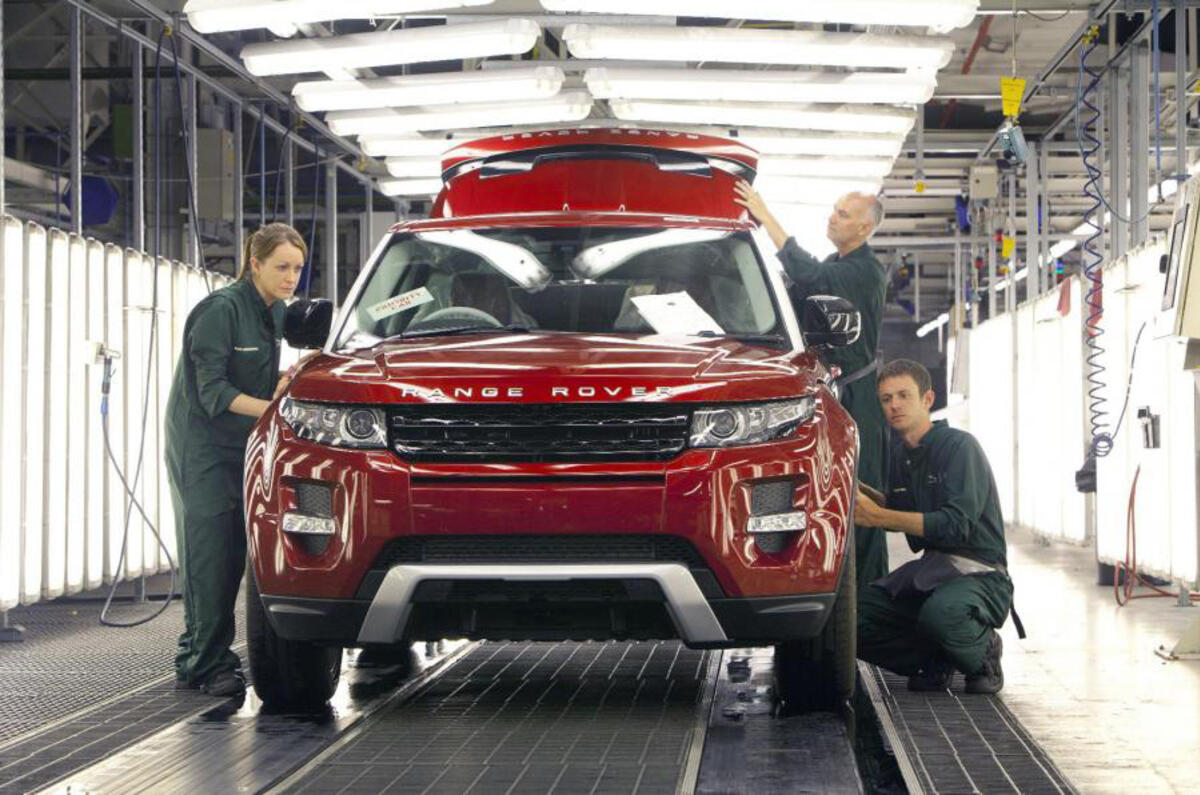Jaguar Land Rover (JLR) will not renew the contracts of 1000 agency workers at its Solihull facility due to industry challenges caused by falling diesel car sales.
JLR is holding meetings today with staff to discuss the changes, which it said are the result of “continuing headwinds” that have forced the company to make "adjustments to production schedules and the number of agency staff”.
In a statement issued on Friday before the number of staff losses was confirmed, JLR said: “We are, however, continuing to recruit large numbers of highly skilled engineers, graduates and apprentices, because we are overproportionally investing in new products and technologies.
“We also remain committed to our UK plants, in which we have invested more than £4 billion since 2010 to future-proof manufacturing technologies to deliver new models.”
Britain’s biggest car manufacturer employs 40,000 people in the UK, of whom a quarter work at the Solihull plant.
Meanwhile, around 360 workers at the Castle Bromwich factory, which builds Jaguar models, are set be relocated to Solihull. The move is attributed to declining output at Castle Bromwich as demand for new cars falls.
Long-standing effects of the ongoing diesel emissions scandal, which include the raising of tax on diesel cars, have driven down demand for diesel cars, so they now represent just 33.5% of the new car market, down from a 44% share last year. Diesel demand fell by 37.2% last month.
Jaguar's Jaguar XE and Jaguar XF are understood to have been hit most heavily, although almost every model has been affected because diesels account for around 90% of JLR's sales.
This year has been one of major contrast for JLR. Following a record-breaking 2017, in which the company sold 621,109 cars, Jaguar demand is currently down 26% year to date, while Land Rover – the bigger brand within the group – has lost a fifth of demand in the UK.
Professor David Bailey of Aston University, an expert in the car industry, said that the latest sales results have hit JLR particularly hard, although he highlighted the brand's ongoing international success.
"It’s important to recognise that, globally, the firm is still doing very well; it’s still investing heavily in new technology and it’s still hiring engineers, apprentices and graduates," he said. "But there’s no getting away from the impact that the Government’s diesel tax has had, sowing extra confusion among drivers who are holding off on replacing diesels."
In January, JLR said that it would cut production numbers at its Halewood plant due to slowing new car sales – something that a company spokesman linked to "concern around the future of petrol and diesel engines" and "general global economic and political uncertainty”.
JLR’s response to changing market demand is already under way, with its first purpose-built electric vehicle, the Jaguar I-Pace, due on roads this summer. The firm has pledged to produce an electrified variant of every model in its range by 2020 as it "works towards a cleaner future”.
More content:
Volvo to focus on electrifying current range before launching next new car
Mercedes-AMG could launch Cayman rival as next bespoke model




Join the debate
Add your comment
Brexit cannot be ignored whether you like it or not!
It might not be direct but right now prices have gone up on many things in the UK while wages remain stagnant. Which is causing people to stay away from unwanted non discounted luxury. UK car market as a whole has declined so whether you are a pro-leave or a remainer brexit has alot to say with manufacturing/businesses ( JLR, New look, restaurant chains etc.).
JLR vehicles emit more pound for pound, at least they aren't cheating.
JLR products are slightly pricy pound for pound , at least they aren't crowding up the roads with every segment there is with pick up trucks and MPVs to super minis.
JLR hasn't got enough hybrid/EV powerplants, 2-3 years aren't enough to develop a whole new tech given the size of the company. But now with investments in Future faraday their up coming EV line up looks strong.
Being British and looking at what they have done in the past 10 years I'm proud of them and want them to suceed. If you want Britain to be strong/ self sustain/ independant support british brands. ( before anyone say they are Indian almost everything from R&D etc are based in the UK, just like most of the F1 teams)
and for the ones who talk about Skoda/Seat and reliability go for it. That is not the segment JLR owners want to be looked at. My BMW gives a bill every other month but I love it , if I wanted reliability would have bought an Avensis. so would the other 3 million people.
wheels wrote:
AUTOCAR reported just over a year ago:
Only last month reports suggested Faraday Future had received £687 million in investment from Indian conglomerate Tata, but the company said: "the news is not true and hence we do not have any comment". US-based Faraday Future is supposedly worth about $9 billion (£6.87bn), meaning the claims for Tata’s investment would have bought it 10% of the company.
Surely this move by Jaguar
Surely this move by Jaguar Land Rover begs the question - Why not bring back production to the U.K. of the E-Pace, I-Pace and the other vehicles that are planned to be built by Magna or in the new Slovakian factory ?
Hybrids
Well I have Lexux RC 300h coupe which has a 2.5 Petrol Hybrid and I'm averaging 53mpg (on eco mode) which is not bad. I'd fancy it's reliabilty over that of a JLR product.